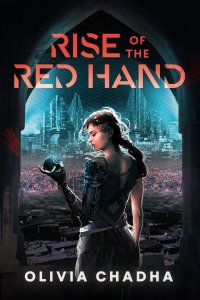Gary K. Wolfe Reviews We Are the Crisis by Cadwell Turnbull
 We Are the Crisis, Cadwell Turnbull (Blackstone 978-1-9826-0375-5, $26.99, 322pp, hc) November 2023.
We Are the Crisis, Cadwell Turnbull (Blackstone 978-1-9826-0375-5, $26.99, 322pp, hc) November 2023.
The notion of vampires, werewolves, and other supernatural critters suddenly coming out of the shadows sounds like a formula-driven conceit on the order of World of Darkness games or Underworld movies, but readers of Cadwell Turnbull’s No Gods, No Monsters quickly learned it can be a lot more complicated than that. Thematically and structurally complex, covering multiple timelines, points of view, and eventually even universes, it turned out to be a stylish literary take on urban fantasy that some readers found challenging, if not actually disorienting. But it was only the first volume of Turnbull’s ‘‘Convergence Saga’’ trilogy, and the second volume, We Are the Crisis, while no less ambitious, does offer some of the classic shape-changing, head-chomping, flamethrowing violence we’ve come to expect from such conceits. Beyond these impressive set pieces, though – which even include a hurricane for good measure – Turnbull once again expands the scope of the narrative, this time involving not only the enigmatic universe-hopping narrator Calvin (who remained a mystery during most of the first novel), but also historical figures such as Jack Parsons, Marjorie Cameron, and the indefatigable Aleister Crowley (who, as I’ve noted in earlier columns, seems to be have a banner year making the rounds of fantasy novels). Perhaps the most striking aspect of Turnbull’s shapeshifting monsters, though, has to do with their motivations: they’re not entirely driven by their appetites, and what they need isn’t victims and midnight snacks. What they need, it seems, is good community organizing.
The novel opens a few years after the ‘‘fracture’’ described in No Gods, No Monsters – now called the emergence – with the familiar lycanthropic trio of Ridley, Laina, and Rebecca, whose Boston bookstore was a crucial setting for the earlier novel. Investigating one of a series of monster disappearances, they find themselves in a violent confrontation with a powerful vampire. But the real danger, it turns out, is an ‘‘anti-monster extremist group’’ called the Black Hand (lest we miss the evident parallels with our own time, it’s elsewhere referred to as a ‘‘human-supremacist’’ movement). Complicating matters further are two ancient secret societies of monsters themselves, not to mention the manipulations of the mysterious Calvin, whose first-person voice is one of the devices that knits the various narratives together. We also again meet the powerful child Dragon, now a teenager, and the former Virgin Islands senator Sondra, who along with her husband Matt – now a senator himself – is trying to promote what amounts to a civil rights bill in the Virgin Islands legislature. Among the newer characters whose stories get woven into the tapestry are a troubled CIA veteran, Alex, and a rather rootless ‘‘wanderer’’ named Tez.
In counterpoint to all those secret societies and hate groups, though, is what seems to be a pretty straightforward organization called New Era, ‘‘a loose coalition of co-ops, collectives, activist organizations, and influential individuals,’’ whose goals are echoed by Sondra and Matt’s quest for social justice legislation in the Virgin Islands. It might seem counterintuitive that one of the more dramatic scenes in a tale full of shape-changing monsters should be a senate debate, but Matthew’s speech underlines some of the novel’s central points: ‘‘Many of us know well the cost of prejudice and subjugation. Our families are the descendants of slaves. Our whole history has been marred by the calamities of hate. We’ve lived in peace with our monster brethren before we even knew they were there.’’ Since many of Turnbull’s central characters are LGBTQIA+ and BIPOC, his warning about the varieties of intolerance is unmistakable in its implications. Whether the efforts of Matthew and others toward community-building and equity succeed, or whether the Convergence Saga is moving toward a cataclysmic war between humans and monsters, seems to be the province of the next novel in this remarkable, relentlessly provocative, and often beautifully written series.
Gary K. Wolfe is Emeritus Professor of Humanities at Roosevelt University and a reviewer for Locus magazine since 1991. His reviews have been collected in Soundings (BSFA Award 2006; Hugo nominee), Bearings (Hugo nominee 2011), and Sightings (2011), and his Evaporating Genres: Essays on Fantastic Literature (Wesleyan) received the Locus Award in 2012. Earlier books include The Known and the Unknown: The Iconography of Science Fiction (Eaton Award, 1981), Harlan Ellison: The Edge of Forever (with Ellen Weil, 2002), and David Lindsay (1982). For the Library of America, he edited American Science Fiction: Nine Classic Novels of the 1950s in 2012, with a similar set for the 1960s forthcoming. He has received the Pilgrim Award from the Science Fiction Research Association, the Distinguished Scholarship Award from the International Association for the Fantastic in the Arts, and a Special World Fantasy Award for criticism. His 24-lecture series How Great Science Fiction Works appeared from The Great Courses in 2016. He has received six Hugo nominations, two for his reviews collections and four for The Coode Street Podcast, which he has co-hosted with Jonathan Strahan for more than 300 episodes. He lives in Chicago.
This review and more like it in the November 2023 issue of Locus.
 While you are here, please take a moment to support Locus with a one-time or recurring donation. We rely on reader donations to keep the magazine and site going, and would like to keep the site paywall free, but WE NEED YOUR FINANCIAL SUPPORT to continue quality coverage of the science fiction and fantasy field.
While you are here, please take a moment to support Locus with a one-time or recurring donation. We rely on reader donations to keep the magazine and site going, and would like to keep the site paywall free, but WE NEED YOUR FINANCIAL SUPPORT to continue quality coverage of the science fiction and fantasy field.
©Locus Magazine. Copyrighted material may not be republished without permission of LSFF.







